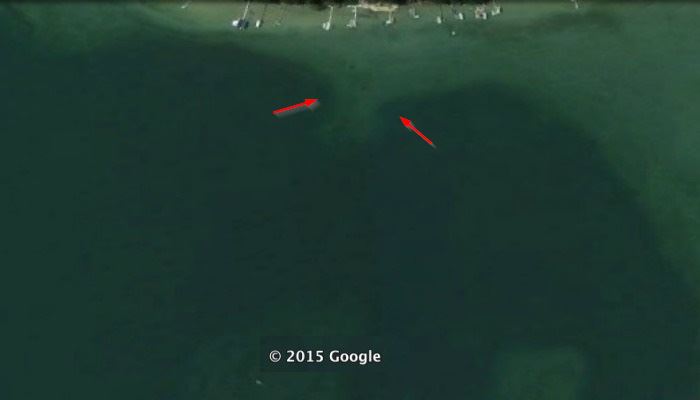
For Mark Zona, smallmouth bass fishing isn’t a hobby, or even a passion—it’s an affliction. If you think a little bit of cold weather, or even a thin layer of ice, is going to keep him and his Nitro Z-21 from crushing some small jaws, you’ve got the wrong guy.
“A lot of people think that when the water dips below 50 degrees, that fish don’t feed, they don’t school up, and they don’t hunt,” Zona started. “They actually form bigger schools and hold tighter to them in colder water than in the heat of summer”.
The all day feeding windows anglers become accustomed to August through October, however, only last mere minutes in the winter. “Little things can activate those schools,” Zona explained. “Changes in wind and light—from sunny to cloudy or cloudy to sunny—can get them going.”
Wind is an aphrodisiac of sorts for smallmouth as it fires them up to hunt and feed—especially when that wind blows directly into a turn as shown below.

Where they Hide
Zona looks for the biggest flat or the biggest point that comes into the lake, usually in the shape of a big rounded triangle. He advises anglers to start on the two bottom tips of that triangle where it turns to go one way or another—the apex of the turn.
Year-in and year-out, smallmouth retreat to a wintering spot where they’ll stay until spring. “From my years of doing this, I can look at my children and say we need to be there right at the crack of dawn once the wind kicks up in this certain turn. The whole premise of this—is turns.”
“Smallmouth are going to come up onto that point to feed first in April, spawn in May, and then they’ll taper off deep of that flat or point for the rest of summer, then come right back to it in October to feed,” Zona explained. “When they’re done feeding in that shallow water through the fall, they’re going to taper into those turns, the bottom of that rounded triangle if it’s a giant flat.”
What’s unique is that the smallmouth will use that turn as cover and will horizontally move up and down the turn knowing it can be shallow or deep within 15 yards. It’s one of the only times of the year where smallmouth use vertical cover constantly.
A simple temperature change of a few degrees may cause fish that were positioned in 8-12 feet of water in the morning to retreat to 26-34 feet within two hours.
Choose your Weapon
A green gizzard shad or clearwater minnow patterned Strike King deep diving jerkbait, are the deal, but not quite the way you think. “It’s a pull bait. Pull-stop-pull-stop. Know that less action and a longer pause, up to 15 seconds, will draw strikes. That technique will catch the first few fish in that turn and generally they are the biggest,” Zona said.
He uses a heavier gauged wire hook, a Trokar to keep it from rising in colder water. He’ll use #5 Lazer Trokar Round Bend 2X Treble Hook and sometimes will resort to a #4. Critics will point out that larger sized trebles will kill the action of the bait and Zona is fine with it—he doesn't want his baits to have any action! In fact, he wants them to appear that they’re dead.
He’ll go back through that same area with a vibrating blade bait and bat cleanup by slow dragging a heavy Strike King Coffee Tube in the KVD Kick pattern. “When the water is that cold, you don’t catch them well with a tube, but once you pound them with a “pull-bait” and blade bait, I always drag a tube through a turn before I’m done pounding on that school,” Zona explained. “I know I’m not going to catch a lot on a tube. But, as I know the first two fish I get from that school will be big ones, so will the last two.”
Catch-and-Where to Release
Zona stresses it’s imperative you follow his theory of catch-and-release. “When you get them going, keep them going, but put legal fish in your livewell this time of year and by gosh don’t lose one. I don’t like a smallmouth going back and telling the other ones the cops are there!”, Zona started. “There may be some biological explanation; on some lakes they are better behaved than other ones!” That logic applies especially to smallmouth living in cold shallow water.”
He’s had magical days on certain lakes cracking them on a jerkbait but they sure don’t take kindly to it. “I’ve found when you kidnap their buddies on one day, they don’t like biting the next day!”
Put them in the boat and take them for a ride!
- 11923 views

